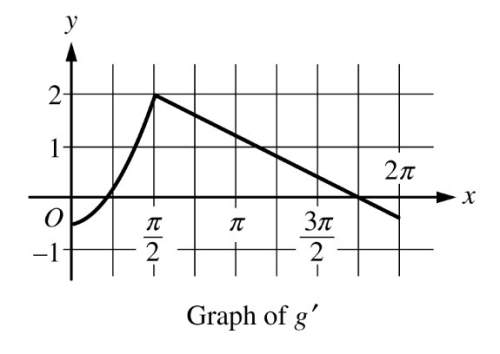Let f be the function defined by f(x) = e^(x) cos x.
(a) find the average rate of change...

Mathematics, 14.11.2019 05:31, KayBJ2005
Let f be the function defined by f(x) = e^(x) cos x.
(a) find the average rate of change of f on the interval 0 ≤ x ≤ π.
(b) what is the slope of the line tangent to the graph of f at x = 3π/2 ?
(c) find the absolute minimum value of f on the interval 0 ≤ x ≤ 2π. justify your answer.
(d) let g be a differentiable function such that g(π/2) = 0. the graph of g', the derivative of g, is shown below. find the value of or state that it does not exist. justify your answer.
(this was on the no-calculator section of the recently-released ap calculus ab 2018 exam so i appreciate it if you tried to limit calculator usage)


Answers: 2
Other questions on the subject: Mathematics

Mathematics, 21.06.2019 14:00, shyannehamilton1183
What values of c and d make the equation true?
Answers: 1

Mathematics, 21.06.2019 15:30, sandyyknguyen4837
Find the slope of the line below . enter your answer as a fraction or decimal. use a slash mark ( / ) as the fraction bar if necessary
Answers: 3

Mathematics, 21.06.2019 22:30, rubycarbajal
The area of a circle is equal to 1 dm². find the radius of the circle.
Answers: 1
Do you know the correct answer?
Questions in other subjects:

German, 26.09.2021 14:00

World Languages, 26.09.2021 14:00

Physics, 26.09.2021 14:00


Mathematics, 26.09.2021 14:00


English, 26.09.2021 14:00

Mathematics, 26.09.2021 14:00


History, 26.09.2021 14:00




 .
.
 so that factor will not generate solutions.
so that factor will not generate solutions.
![\displaystyle\cos(x) = \sin(x) \implies 0 = \frac{\sin (x)}{\cos(x)} \implies 0 = \tan(x) \implies \\ \\ x = \pi/4,\ 5\pi/4\ \forall\ x \in [0, 2\pi]](/tpl/images/0373/7229/cd5fb.png)






 .
. , the numerator and denominator both approach zero. Thus we use L'Hospital's rule to evaluate the limit.
, the numerator and denominator both approach zero. Thus we use L'Hospital's rule to evaluate the limit.






